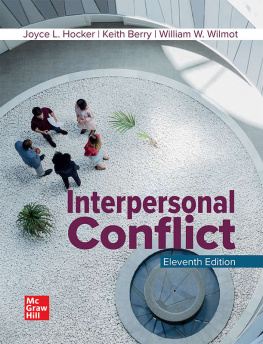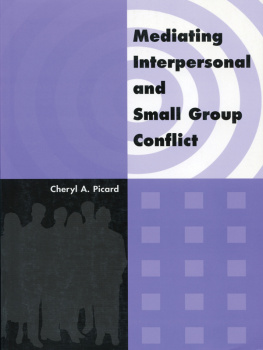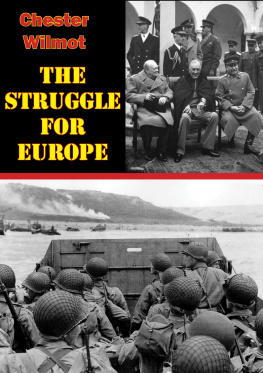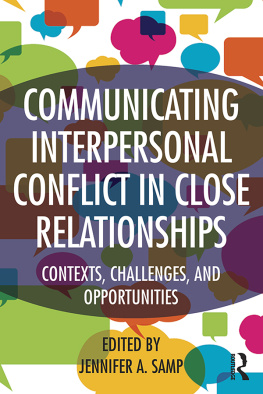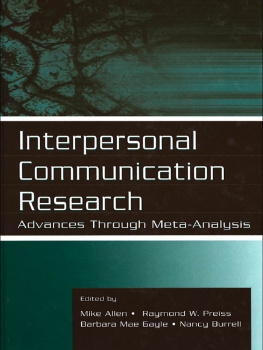William Wilmot - Interpersonal Conflict, Eleventh Edition
Here you can read online William Wilmot - Interpersonal Conflict, Eleventh Edition full text of the book (entire story) in english for free. Download pdf and epub, get meaning, cover and reviews about this ebook. year: 2021, genre: Home and family. Description of the work, (preface) as well as reviews are available. Best literature library LitArk.com created for fans of good reading and offers a wide selection of genres:
Romance novel
Science fiction
Adventure
Detective
Science
History
Home and family
Prose
Art
Politics
Computer
Non-fiction
Religion
Business
Children
Humor
Choose a favorite category and find really read worthwhile books. Enjoy immersion in the world of imagination, feel the emotions of the characters or learn something new for yourself, make an fascinating discovery.
- Book:Interpersonal Conflict, Eleventh Edition
- Author:
- Genre:
- Year:2021
- Rating:4 / 5
- Favourites:Add to favourites
- Your mark:
- 80
- 1
- 2
- 3
- 4
- 5
Interpersonal Conflict, Eleventh Edition: summary, description and annotation
We offer to read an annotation, description, summary or preface (depends on what the author of the book "Interpersonal Conflict, Eleventh Edition" wrote himself). If you haven't found the necessary information about the book — write in the comments, we will try to find it.
Interpersonal Conflict, Eleventh Edition — read online for free the complete book (whole text) full work
Below is the text of the book, divided by pages. System saving the place of the last page read, allows you to conveniently read the book "Interpersonal Conflict, Eleventh Edition" online for free, without having to search again every time where you left off. Put a bookmark, and you can go to the page where you finished reading at any time.
Font size:
Interval:
Bookmark:
Page i
Page ii
Page iii
Interpersonal
Conflict
Eleventh Edition

Joyce L. Hocker
Keith Berry
William W. Wilmot

Page iv

INTERPERSONAL CONFLICT, ELEVENTH EDITION
Published by McGraw Hill LLC, 1325 Avenue of the Americas, New York, NY 10121. Copyright 2022 by McGraw Hill LLC. All rights reserved. Printed in the United States of America. Previous editions 2018, 2014, and 2011. No part of this publication may be reproduced or distributed in any form or by any means, or stored in a database or retrieval system, without the prior written consent of McGraw Hill LLC, including, but not limited to, in any network or other electronic storage or transmission, or broadcast for distance learning.
Some ancillaries, including electronic and print components, may not be available to customers outside the United States.
This book is printed on acid-free paper.
1 2 3 4 5 6 7 8 9 LCR 26 25 24 23 22 21
ISBN 978-1-260-83695-0 (bound edition)
MHID 1-260-83695-9 (bound edition)
ISBN 978-1-264-16428-8 (loose-leaf edition)
MHID 1-264-16428-9 (loose-leaf edition)
Portfolio Manager: Sarah Remington
Product Developers: Elisa Odoardi, Amy Oline
Marketing Manager: Kelly Ross
Content Project Managers: Maria McGreal, George Theofanopoulos
Buyer: Laura Fuller
Designer: Matt Diamond
Content Licensing Specialist: Sarah Flynn
Cover Image: Caiaimage/Martin Barraud/Getty Images
Compositor: MPS Limited
All credits appearing on page or at the end of the book are considered to be an extension of the copyright page.
Library of Congress Cataloging-in-Publication Data
Names: Hocker, Joyce L., author. | Berry, Keith (Associate professor), author.
Title: Interpersonal conflict / Joyce L. Hocker, Keith Berry.
Description: Eleventh edition. | New York, NY : McGraw Hill LLC, [2022] |
Includes bibliographical references and index.
Identifiers: LCCN 2020050138 (print) | LCCN 2020050139 (ebook) |
ISBN 9781260836950 (hardcover) |
ISBN 9781264164288 (spiral bound) | ISBN 9781264164264 (ebook)
Subjects: LCSH: Interpersonal conflict. | Conflict (Psychology)
Classification: LCC HM1121 .W56 2022 (print) | LCC HM1121 (ebook) | DDC 158.2dc23
LC record available at https://lccn.loc.gov/2020050138
LC ebook record available at https://lccn.loc.gov/2020050139
The Internet addresses listed in the text were accurate at the time of publication. The inclusion of a website does not indicate an endorsement by the authors or McGraw Hill LLC, and McGraw Hill LLC does not guarantee the accuracy of the information presented at these sites.
mheducation.com/highered
Page v
To our students, who continue to inform,challenge, and enrich our thinking about conflictresolution. We write for you. You inspire us. Maythe book inspire you to live with more hope thancynicism as you face the conflict that complicatesour lives.
Page vi
Page vii
Page viii

Page ix
Page x
Page xi
Page xii
Page xiii
Page xiv
Page xv
The eleventh edition of Interpersonal Conflict keeps with the books tradition of examining the central issues that inform conflict and, in turn, make our personal and professional lives challenging and fascinating. We continue to provide recent research and a wide array of cases and applications, which invite readers to reflect on, and better understand, conflict as it pertains to the unique vantage point of students lived experience. This new edition also includes new cases and applications and reflects recent cultural changes that shape the ways people move through conflict.
We have revised all of the chapters with a sharp eye to clarity, new research, and writing. In some chapters, we have reorganized or rewritten sections to improve on their relevance to todays readers. In addition, we have chosen to eliminate the chapter Third-Party Intervention in favor of including a new chapter on the ubiquitous societal problem of bullying. Also, we have included a new chapter on reconciliation and forgiveness. The chapter on reconciliation and forgiveness includes some material from the last edition of the text on the ways in which third parties may be helpful in reconciling partners and groups. We made this choice partly because students who wish to pursue third-party skills need to do so with professional credentialing.
Keith Berry, University of South Florida, is the new co-author of the book. Keiths research and teaching take a cultural approach to the study of relational communication. Methodologically speaking, he relies heavily on ethnography, autoethnography, and phenomenology. His work primarily focuses on the ways in which peoples identities inform, and are informed by, communication. Common to his teaching and research are questions about the role and impact of conflict in relating. Keith is especially interested in exploring underrepresented and vulnerable populations, and, more generally, issues of social justice. Much of Keiths research over the last 11 years has examined the intersections of bullying, communication, and conflict. This includes his solo-authored and award-winning book Bullied: Tales of Torment, Identity, and Youth (Routledge). He has served as the Co-chair of the National Communication Associations (NCA) Anti-Bullying Task Force and Chair of NCAs Ethnography Division.
Joyce Hocker continues her role as reviewer, consultant, and adviser to the current edition. She is semi-retired as a communication consultant and clinical psychologist, still immersed in the practices and problems of conflict resolution. She consults with therapists and teaches life writing in the University of Montana lifelong learning program. The Trail to Tincup: Love Stories at Lifes End (SheWritesPress) is her memoir of loss and resilience.
Chapter One, The Nature of Conflict, retains the resilient definition of conflict that has gained acceptance and use for more than four decades. The definition serves as the chapters main framework. The chapter still includes activities on intrapersonal conflict, which introduce students to self-reflection as a basic first step in this area of study. We also continue to emphasize the relevance of relationships to conflict. In addition, we have added discussions on the concept and practice of mindfulness, which we return to throughout the rest of the book. Our engagement with mindfulness serves multiple purposes, including reminding students of the importance of gentleness and nonjudgement within conflict and learning about conflict. Also, the concept of chosen families is now included in the first chapter. We have also added the case The Roommate Compromise, which highlights the ways communication climates (e.g., supportive and defensive) shape conflict. Overall, the chapter makes an important and ongoing case for the study of conflict from an interpersonal communication perspective.
Page xvi
Chapter Two, Perspectives on Conflict, keeps the popular section on worldviews that influence ones approach. The metaphors of conflict section retains its simplified approach, organizing metaphors around danger and opportunity, used in past editions. This chapter retains the recently added section that explores how narratives frame conflict, with an extensive case study that helps to illustrate the approach. New to this chapter is a definition of culture. We invite students to reflect on conflict in terms of culture, and cultural variations in practices and meanings, throughout the book. The newly added case Is It a Game or Balance? invites students to reflect on the ways in which ones perspective shapes conflict.
Next pageFont size:
Interval:
Bookmark:
Similar books «Interpersonal Conflict, Eleventh Edition»
Look at similar books to Interpersonal Conflict, Eleventh Edition. We have selected literature similar in name and meaning in the hope of providing readers with more options to find new, interesting, not yet read works.
Discussion, reviews of the book Interpersonal Conflict, Eleventh Edition and just readers' own opinions. Leave your comments, write what you think about the work, its meaning or the main characters. Specify what exactly you liked and what you didn't like, and why you think so.

